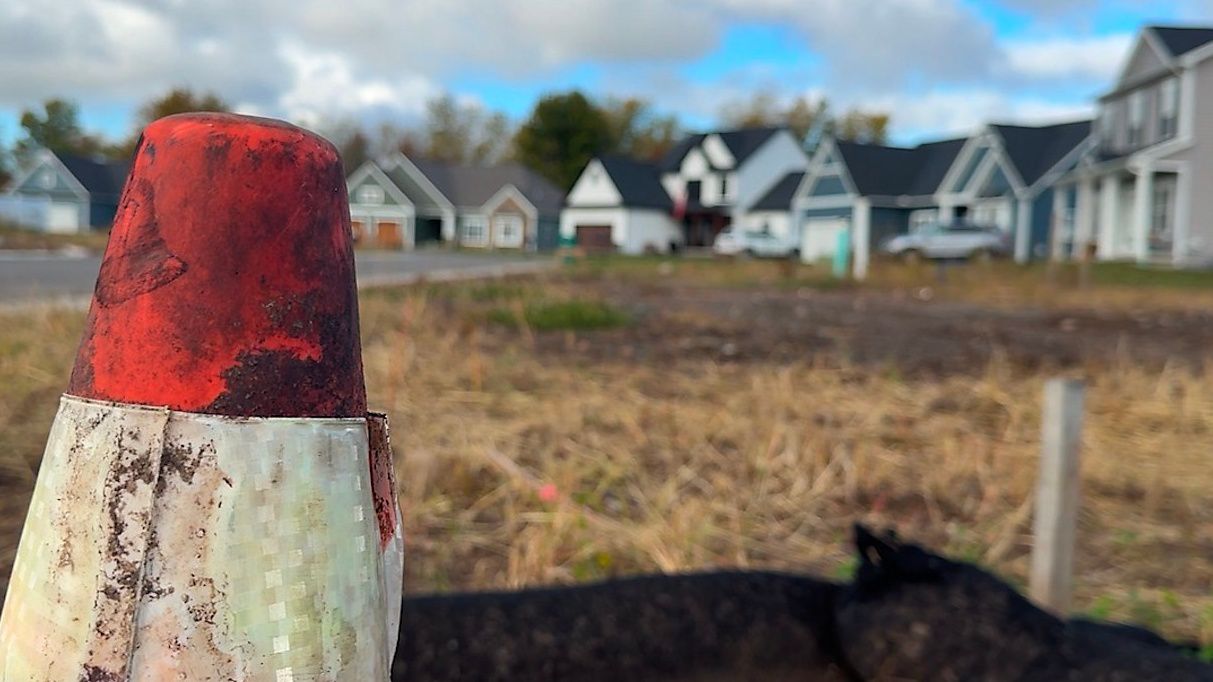ROCHESTER, N.Y. — A trade association representing home builders says a looming change in state law, banning the use of gas and propane in new builds, is already causing delays in construction. This, as New York deals with a major housing shortage. Builders say the grid can’t handle the projected increase in electricity demand.
Four Mile Creek is a development east of Rochester. Three-hundred units are planned, a mix of single-family houses and townhomes. But only 40 have been built.
“So we’re kind of on hold here,” said John Graziose, vice president of Gerber Homes, the project’s builder.
Graziose says a state mandate that takes effect Jan. 1 is causing delays. The new law will ban natural gas and propane equipment in all new buildings up to seven stories tall. The fossil fuel ban means all stoves, furnaces, water heaters and dryers on new builds have to run on electricity. Home builders say they can’t proceed because the power companies don’t have the capacity to handle the additional demand.
“It just seems really ridiculous that we’re still moving forward with not allowing natural gas and or other fossil fuels in new developments where the gas is available. It’s already there and there’s not enough electrical power,” said Graziose.
The Rochester Home Builders’ Association is trying to educate people about the new law. The requirement is part of the All-Electric Buildings Act, passed by New York lawmakers in 2023, a green initiative designed to lessen the reliance on fossil fuels.
“Once we go to start construction, when we do have gas and electric, there already isn’t enough capacity,” said Jim Barbato, chair of RHBA. “So once we switch to just electric, there’s going to be even less capacity available for us.”
Home builders are pushing for the state to delay the implementation of the fossil fuel ban until improvements are made to the electric grid.
“It’s going to be a challenge with our electric grid capacity,” said Joseph Sayre, economic development manager for Rochester Gas & Electric and New York State Electric & Gas.
We asked Sayre if the utilities will be able to handle the increase in electricity demand.
“It’s really location specific, so that’s not a question I can just give a general yes or no to,” he said. “But that’s what we’re trying to do with our rate case, is build a system that can meet those needs.”
The utilities have asked the state Public Service Commission for rate increases to pay for necessary upgrades to substation transformers, and to build new transmission lines to places where new buildings are going up. The planned investment in RG&E’s territory alone totals more than $5 billion. And upgrades won’t happen overnight.
“It’s true that electrical infrastructure projects do take time,” said Sayre. “A lot of the proposals we have are three-to-five-year types of projects to really be able to build that grid of the future.”
We asked Gov. Kathy Hochul’s office to respond specifically to the concerns of homebuilders and the utilities. This was the response from Ken Lovett, the governor’s senior communications advisor on energy and environment:
“Those concerned about rising home construction costs should join the Governor in calling for Republicans in Congress to put an end to the tariffs imposed by the Trump Administration that are driving costs up on everything from steel and lumber to home appliances. Now is the time for these representatives to end the federal government shutdown, get back to work, and act in the best interests of their constituents, including home builders who are hurting as a result of their tariffs.”
“I think the part that the state doesn’t realize, or the governor doesn’t realize, is that every cost that goes into a new home gets passed to the customer,” responded Graziose.
Graziose says developers already front the costs for everything that goes into a new home, including infrastructure like electricity. In the end, customers pay for all of it.
“When are we going to be able to move forward? He asked. “And what’s the cost going to be?”
New York is in a housing crisis. Graziose says the timing of the gas ban is delaying the possible solution.
“They’re making it more and more difficult, which is just the opposite of what we all are supposedly trying to do,” he said. “We’re supposedly building homes that people can afford, to raise their family to have a good home, and right now they’re making that almost impossible.”

